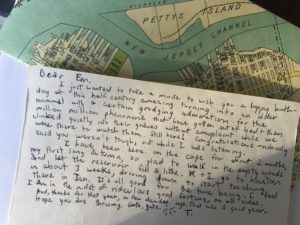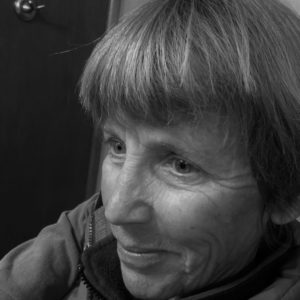 Every December, in the hallway outside the kitchen, my mother tacked up a large piece of construction paper divided into five columns. This was the Christmas list, and on it we five kids were invited to write our wants, our desires. From age 8 to 14 the only things that appeared in my column were two words: rowing machine. Some years it looked like this: ROWING MACHINE, all caps and magic marker thick. I never asked for pajamas that matched my sister’s. I never wanted stationary that smelled like powder. Socks were useful but hardly gift material. I wanted a rowing machine, and I wanted it and wanted it and wanted it.
Every December, in the hallway outside the kitchen, my mother tacked up a large piece of construction paper divided into five columns. This was the Christmas list, and on it we five kids were invited to write our wants, our desires. From age 8 to 14 the only things that appeared in my column were two words: rowing machine. Some years it looked like this: ROWING MACHINE, all caps and magic marker thick. I never asked for pajamas that matched my sister’s. I never wanted stationary that smelled like powder. Socks were useful but hardly gift material. I wanted a rowing machine, and I wanted it and wanted it and wanted it.
And every year I was disappointed. In Buddhist parlance, I suffered. My mother gave me a drum and drum lessons to go with it. She made several pairs of overalls for me, beautiful creations that suited my tomboy nature. Year after year under the Christmas tree were books I might have devoured, remote control cars, gerbils, ice skates, a model sailboat kit, a left-handed baseball mitt, even a sundial—and how I suffered! An extraordinary thing to suffer in the midst of so many riches, and all because the object in my sights, the object I was certain I desired beyond all others, never appeared.
I was one of the lucky ones.
The underside of gifts given is that suddenly there is nothing more to desire—an uncomfortable place for most humans, but treatable. The usual treatment is simply to desire something else; to long for the next thing we do not have. In the best of ways I was spared this discomfort. I placed my longing firmly on an absurd contraption, a machine that might have prepared me for that great New England crew race, the Head Of The Charles. Or an Atlantic crossing. Or a whaling career, a modern-day Ishmael. “Call me Margaret,” I might have whispered as I sweated and grunted through another workout on the truly diabolical ‘60s version of a rowing machine. Yes, I was lucky. I pinned my hopes, which became an obsession, a quest, on an unreachable star and did not notice the slow fading of that star until it was all but gone. Out of sight. Swallowed up not by other desires but by a sense of accommodation—this is how it goes; this is what we get. A feeling that to cultivate agility, receptivity and a near-acrobatic flexibility was to survive.
My friend, Tony Hoagland, died a few weeks ago, just before Halloween. When I read his poetry now he is still alive for me—a nice touch in this world of impermanence, T. Thank you. And isn’t that what art is after all? An act of defiance? A rewriting of the story of inevitable death? In Tony’s poem “History of Desire,” the only thing that hasn’t transformed is the decades-old declaration of love or lust spray-painted on the water tower: RON LOVES DORIS. Much like ROWING MACHINE, the words are slow to fade from memory or sight and carry with them the uncomfortable reminder of desire’s bedfellow, suffering.
You don’t consider for a moment
the shock in store for you in 10 A.D.,
a decade after Doris, when,
out for a drive on your visit home,
you take the Smallville Road, look up
and see RON LOVES DORIS
still scorched upon the reservoir.
This is how history catches up—
by holding still until you
bump into yourself.
What makes you blush and push
the pedal of the Mustang
almost through the floor
as if you wanted to spray gravel
across the features of the past
or accelerate into oblivion?
Tony wrote directly and indirectly about desire—mostly physical desire with its propelling and simultaneously doomed energy. Desire as acceleration. Cars of every make and model moving through the night. He also wrote of the tension between wanting and getting. His comfort zone, much like mine, was in the thwarted quest. In his younger life he didn’t trust happiness, which he admits beautifully in a poem called “Sweet Ruin”:
even at this moment, even when the world
seems so perfectly arranged, I feel
a force about to take it back.
Like a smudge on the horizon. Like a black spot
on the heart. How one day soon,
I might take this nervous paradise,
bone and muscle of this
extraordinary life,
and with one deliberate gesture,
like a man stepping on a stick,
break it into halves. But less gracefully
than that. I think there must be something wrong
with me, or wrong with strength, that I would
break my happiness apart
simply for the pleasure of the sound.
Desire is perilous, though it would not be if we could allow ourselves to welcome what it does not bring; if we could anticipate and respect the disappointments that inevitably come with setting our sights on anything—even something as ordinary as a contented life. In a poem called “Adam and Eve,” the final two lines are:
Until we say the truth there can be no tenderness.
As long as there is desire, we will not be safe.
As Tony’s poems moved with him through his life, desires softened to longings until, in his very last poems he knows his heart’s habit and knows that we know it as well. He knows that what he wants and desires is not outside of him, that he is accompanied, that what he longs for he already has. The quest has been internal all the time. To put it in a way that a younger Tony, the Tony I knew, would chafe at, perhaps, and turn to irony: Finally, he is safe. He is loved.
It’s just me now
and my famous aching
heart under the stars—my
heart that keeps moving like
a searchlight
in its longing for the hearts of
other people,
who in a sense, already live
there, in my heart, and keep
it turning.

